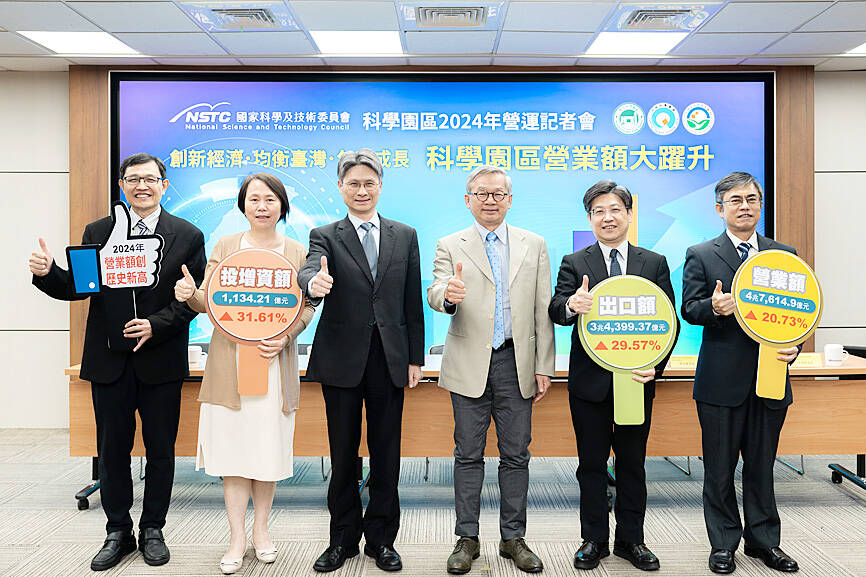The nation’s three major science parks posted record combined revenue of NT$4.76 trillion (US$144.41 billion) for last year, up 20.73 percent year-on-year, the National Science and Technology Council said in a report yesterday.
The council attributed the strong performance to rising demand for emerging technologies such as artificial intelligence (AI) and the end of inventory adjustments throughout the global semiconductor supply chain, the report said.
Combined revenue of firms at Hsinchu Science Park (新竹科學園區) increased 6.66 percent annually to NT$1.51 trillion, Central Taiwan Science Park (中部科學園區) posted revenue growth of 10.22 percent to NT$1.04 trillion and Southern Taiwan Science Park (南部科學園區) grew 39.55 percent to NT$2.21 trillion, the council said.

Photo courtesy of the National Science and Technology Council
Southern Taiwan Science Park’s revenue exceeded the NT$2 trillion mark for the first time, spurred by a higher sales contribution by semiconductor firms led by Taiwan Semiconductor Manufacturing Co (TSMC, 台積電), it said.
Regarding TSMC’s plans to construct 11 new production lines in Taiwan this year, the council is planning the second phase of expansion at Central Taiwan Science Park’s Taichung campus as a possible site for the chipmaker’s new investment at home, National Science and Technology Council Minister Wu Cheng-wen (吳誠文) told a news conference in Taipei.
“The government would continue to assist TSMC’s development in Taiwan” in terms of land, labor and utility, Wu said.
TSMC is expected to start mass production of chips using advanced node technologies at Hsinchu Science Park’s Baoshan (寶山) campus and Southern Taiwan Science Park’s Kaohsiung campus, while it plans to produce next-generation, cutting-edge 1.4-nanometer chips, he said.
Last year, the three science parks exported a combined NT$3.44 trillion of goods, up 29.57 percent from a year earlier, as the AI boom helped drive shipments of advanced chips and emerging-technology products, the report said.
At the same time, the combined imports of the three parks rose 35.33 percent to NT$2.4 trillion as a result of companies continuing to build factories and expand production, which boosted purchases of precision machinery and equipment from abroad, it said.
Overall, the three parks saw two-way trade increase 31.88 percent year-on-year to NT$5.84 trillion last year, also a new high, it added.
Of the parks’ six major industries, the IC industry was top in terms of revenue, rising 25.4 percent year-on-year to NT$3.81 trillion, followed by the optoelectronics industry with an increase of 6.89 percent to NT$439.04 billion, the report said.
Revenue of the computer and peripherals industry grew 8.02 percent to NT$224.35 billion, precision machinery industry sales rose 15.03 percent to NT$144.97 billion and the biotechnology industry reported sales were up 9.64 percent to NT$46.5 billion, it said.
However, revenue of the communications industry decreased 25.11 percent to NT$74.71 billion, as geopolitical tensions pushed firms to adjust their supply chain deployment, the report said.
The council said it anticipates a steady increase in the parks’ revenue this year on the back of the continued development of advanced process technologies and AI applications, despite uncertainties created by tariffs policies and other protectionist trade measures of US President Donald Trump’s administration, as well as the persistent shadow of geopolitical risks.

TARIFFS: The global ‘panic atmosphere remains strong,’ and foreign investors have continued to sell their holdings since the start of the year, the Ministry of Finance said The government yesterday authorized the activation of its NT$500 billion (US$15.15 billion) National Stabilization Fund (NSF) to prop up the local stock market after two days of sharp falls in reaction to US President Donald Trump’s new import tariffs. The Ministry of Finance said in a statement after the market close that the steering committee of the fund had been given the go-ahead to intervene in the market to bolster Taiwanese shares in a time of crisis. The fund has been authorized to use its assets “to carry out market stabilization tasks as appropriate to maintain the stability of Taiwan’s

STEEP DECLINE: Yesterday’s drop was the third-steepest in its history, the steepest being Monday’s drop in the wake of the tariff announcement on Wednesday last week Taiwanese stocks continued their heavy sell-off yesterday, as concerns over US tariffs and unwinding of leveraged bets weighed on the market. The benchmark TAIEX plunged 1,068.19 points, or 5.79 percent, to 17,391.76, notching the biggest drop among Asian peers as it hit a 15-month low. The decline came even after the government on late Tuesday authorized the NT$500 billion (US$15.2 billion) National Stabilization Fund (國安基金) to step in to buoy the market amid investors’ worries over tariffs imposed by US President Donald Trump. Yesterday’s decline was the third-steepest in its history, trailing only the declines of 2,065.87 points on Monday and

TARIFF CONCERNS: The chipmaker cited global uncertainty from US tariffs and a weakening economic outlook, but said its Singapore expansion remains on track Vanguard International Semiconductor Corp (世界先進), a foundry service provider specializing in producing power management and display driver chips, yesterday withdrew its full-year revenue projection of moderate growth for this year, as escalating US tariff tensions raised uncertainty and concern about a potential economic recession. The Hsinchu-based chipmaker in February said revenues this year would grow mildly from last year based on improving supply chain inventory levels and market demand. At the time, it also anticipated gradual quarter revenue growth. However, the US’ sweeping tariff policy has upended the industry’s supply chains and weakened economic prospects for the world economy, it said. “Now

Six years ago, LVMH’s billionaire CEO Bernard Arnault and US President Donald Trump cut the blue ribbon on a factory in rural Texas that would make designer handbags for Louis Vuitton, one of the world’s best-known luxury brands. However, since the high-profile opening, the factory has faced a host of problems limiting production, 11 former Louis Vuitton employees said. The site has consistently ranked among the worst-performing for Louis Vuitton globally, “significantly” underperforming other facilities, said three former Louis Vuitton workers and a senior industry source, who cited internal rankings shared with staff. The plant’s problems — which have not